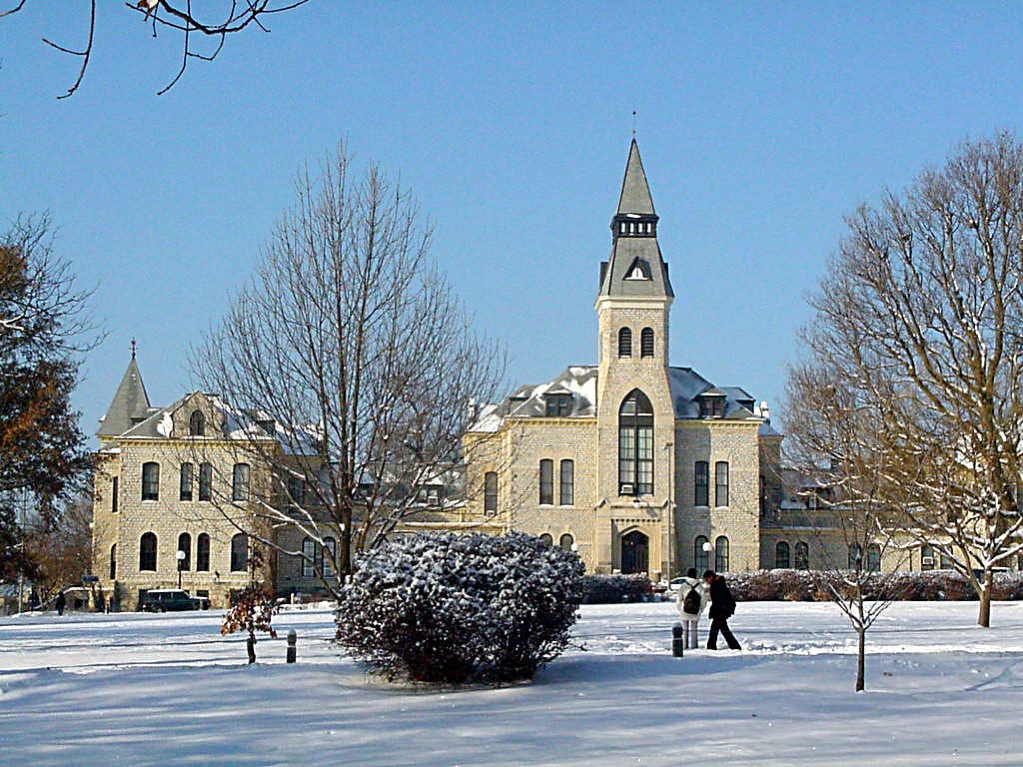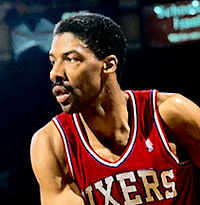In yesterday’s post, I skipped past the actual getting of the job. (Oops.) Today, I’ll talk about that.
Oh, but enough about me. What do you think of me?
–Â old joke
4. To Market, to Market, to Get Me a Job
 In 1999, I had three interviews. The first was pleasant enough. The second was unpleasant. Indeed, if I’d already had a job, then halfway into that interview I would have said, “Based our conversation so far, I expect you’re looking for a different candidate.  Thanks very much for taking the time to meet me, and best of luck with your search.” Then I would have shook hands, offered thank-yous, and left. But I didn’t have a job. So, I stuck it out, and – when I returned from the conference – wrote the obligatory thank-you note, even though there was no way I’d get a campus visit.
In 1999, I had three interviews. The first was pleasant enough. The second was unpleasant. Indeed, if I’d already had a job, then halfway into that interview I would have said, “Based our conversation so far, I expect you’re looking for a different candidate.  Thanks very much for taking the time to meet me, and best of luck with your search.” Then I would have shook hands, offered thank-yous, and left. But I didn’t have a job. So, I stuck it out, and – when I returned from the conference – wrote the obligatory thank-you note, even though there was no way I’d get a campus visit.
The third interview was a lot of fun. Before I explain why, I should also tell you how I prepared for all three interviews. Since each hiring committee told me who would be on the interview team, I read the scholarship of each interviewer. I should have spent more time on the websites looking at course offerings, but I did develop sample syllabi so that I could be prepared to answer questions like “What would you teach in a Children’s Literature course?” or “If you could teach your dream graduate seminar, what would it be on?” and so on. In retrospect, I probably should have made copies of these syllabi to give to my interviewers, but the preparation enabled me to talk about these imaginary classes. (I had neither taught nor formally studied Children’s Literature prior to my arrival at Kansas State.) I also, of course, had the dissertation soundbite. I’d rehearsed answers to other possible questions – and, by rehearsed, I mean not only learned, but actually practiced speaking them out loud. (Yes, acting is key to success!) Anyway, my point is that I went into each interview prepared.
So, if I was equally prepared for all interviews, then why was the third interview so much fun? In this one, the interview team was prepared for me. They’d read my writing sample closely, and asked informed questions that conveyed (what I took to be) genuine interest. The interviewers clearly got along with each other. Their comfort made for a comfortable interview experience. They also knew what they were looking for in a children’s lit hire: I didn’t sense dissent or opposing “camps.” Having since been through other interviews (on both sides), the best interviews are a like a good chat with smart people at a cocktail party. You may have heard that comparison before. Well, it’s true – only, of course, without the cocktails.
By the way, here’s one unanticipated question I remember from this third interview: “Which do you prefer – teaching, research, or service?”  I began my answer with: “Gosh, that’s a tough question.”  Then, I described merits of all three.  I knew that academia ranks research highest, and that my own personal preferences would rank both it and teaching ahead of service. But admitting that would not have been the most persuasive thing to say. In any case, we have do to all three, and I’m a team player: I expected to do all three. So, best to express my willingness to do all parts of the job. Which I did.
A couple of weeks after the interview – or perhaps even sooner than that – the department head phoned me to set up the campus visit.
5. The Semi-Finals; or, the Campus Visit
Getting invited to campus is like making the semi-finals. You haven’t got the job, but you’re among the top two or three candidates.
 To prepare, I visited the website, and read up on the place. I also printed out a list of all the faculty members, and tried to familiarize myself with their names and specialties. When I had downtime during the visit, I would make notes on the printout – what we talked about, anything that would help me remember the person’s name. (I’m terrible with names! I really have to work at learning them.) And, the job talk. I kept it to the length specified by the department head – 30 minutes. (Note: if they don’t tell you the length, then ask them! You don’t want to run long or be too brief.) I keyed up my script (the talk) to the images. I rehearsed the talk until it felt fluent, and rehearsed answers to any other possible questions I thought I might face.
To prepare, I visited the website, and read up on the place. I also printed out a list of all the faculty members, and tried to familiarize myself with their names and specialties. When I had downtime during the visit, I would make notes on the printout – what we talked about, anything that would help me remember the person’s name. (I’m terrible with names! I really have to work at learning them.) And, the job talk. I kept it to the length specified by the department head – 30 minutes. (Note: if they don’t tell you the length, then ask them! You don’t want to run long or be too brief.) I keyed up my script (the talk) to the images. I rehearsed the talk until it felt fluent, and rehearsed answers to any other possible questions I thought I might face.
The campus visit was fun, if intense: as you might expect, you are “on” all the time. And nearly all of your time is scheduled. My hosts were friendly, personable, and – as the hiring committee was at the MLA interview – genuinely interested in me and my work. When I left after three days (I think it was three), I was tired but pleased. I didn’t know whether I’d get the job, but I felt that I’d put forth a solid effort, and sensed that, irrespective of the outcome of the search, I’d stay in touch with some of the people I met there.
A few weeks later, after the First Choice candidate turned the job down, they made me (Mr. Second Choice) an offer. I accepted.
6. Tenure for Two
But this is not as simple as I’m making it out to be. If you read yesterday’s post, you’ll remember that there’s also a spouse involved. When we went to the College of Charleston, I was the trailing spouse. If we were going to Kansas State University (which, as you’ve probably figured out by now, was the third interview and sole campus visit), we did not want to have a repeat of our experience at the College of Charleston.
We know now that we could have handled that situation differently. Although our College of Charleston English Department Chair expressed indifference to my professional situation, Karin (my spouse) and I might have negotiated at the time of her offer. After all, the worst answer you can get is “No,” and you might get something better. Â Two years later, as I went on the market and received the campus interview, we should have been more proactive and told the department chair and dean. Â Doing so would have given the College time to assemble a counter-offer, should it wish to retain us in the face of a campus visit becoming a job offer. However, we didn’t tell any of the higher-ups and so, when the Kansas offer came, the College was not prepared to make a counter-offer. Â Having a counter-offer would have been useful for two reasons. Â First, if Karin and I had wanted to stay in Charleston, a tenure-track job for me would have made that possible. (Though Charleston’s Confederate fetish is a bit disturbing, we had –Â and have –Â many friends there, and we were sorry to leave them.) Â Second, having a counter-offer could have provided a bargaining chip to use with Kansas State – we might have been able to use it to get Karin immediately on the tenure-track, or we might have been able to use it to negotiate a higher salary for myself, and/or to negotiate other things. Â If you’re in a situation where more than one institution wants you, then your market value rises and you’re in a position to bargain for more.
Though we didn’t know any of these strategies then, we were nonetheless determined to make the move to Kansas State a happier situation for both of us. In case the subject came up, I had brought a few copies of Karin’s CV with me on the campus visit. Officially, they’re not allowed to ask about spouses or partners, so you might need to listen for hints and opportunities. One morning over breakfast, the Department Head mentioned that he had just written an article on the need to take spousal needs into account, which I interpreted as a fairly broad hint (though it was also true; he had written the article). Â I suspect that a Department Head in a slightly more remote location (such as Manhattan, Kansas) may be need to be more sensitive to such an issue, but – whatever the reason – he was sympathetic. Â So, I gave him a copy of her CV, and spoke a little about her work. She subsequently provided a letter of interest, writing sample, and dossier for the department’s review.
When the offer came, we managed to get Karin hired as a Visiting Assistant Professor – non-tenure-track, but with the understanding that the Department would try to move her back onto the tenure track. Â So that she had a backdoor, Karin negotiated a year’s leave of absence (instead of quitting) from the College of Charleston, and we moved to Manhattan, KS in July of 2000. Â Karin made herself indispensable to the Department, becoming the Department’s Technology Coordinator. Â This position didn’t officially exist, but Karin saw a need and stepped in to fill that need. Â She also participated fully in the life of the Department, going to faculty meetings, serving on committees, and generally being a team player. Â Of course, she kept teaching and publishing, too. Â At the end of our first year, we set up a meeting with the Department Head to ask how we could get Karin back on the tenure track. Â He advised both of us to go on the job market. Â Meanwhile, the Department would do a national job search for 20th Century British Literature (Karin’s field, in which she has a sub-specialty in contemporary British literature, an area not otherwise covered in the Department).
Thus, Karin and I went on the market in the fall of 2001.  I had an MLA interview and a campus visit; Karin had two MLA interviews and two campus visits, one of which was Kansas State. During visits, we mentioned the need for two tenure-track jobs as one reason for our seeking the position. When it was time for Karin’s campus visit at Kansas State, I did not see her talk (I was advised not to attend), and nor could I vote on her hire, but the Department judged her the best of the three candidates, and made her an offer.  Rather than wait for offers from the universities where we had other campus interviews (in hopes of using them as leverage), we decided to withdraw from those searches before they concluded.  Let me be clear: I was genuinely interested in that job, and Karin was interested in the other job as well. If one had made an offer to both of us, we would have accepted. But Kansas made the offer first, and we were happier here than I think we would have been at the other universities. So, as of fall 2002, Karin was back on the tenure-track, and her work at Kansas State as a Visiting Assistant Professor would count towards her tenure portfolio.  She went up for tenure early and was promoted to Associate in 2006, and I was promoted the year earlier to Associate (and in 2008 to Full). Since 2007, she has been Department Head.
7. Now, Class, What Have We Learned?
Some lessons that might be drawn from our experience: Be both proactive and strategic.  Also, in this field, you get to choose the lifestyle, but not the location.  Kansas was not our first choice of places to live, but it’s a good gig (2-3 teaching load) with great colleagues. If you want to choose where you live, then you’re in the wrong profession. Aim for quality of life rather than idyllic locale.
It’s been a busy decade. The ambitious (pronounced “nutty”) publishing regimen and opportunism has helped my career. Or, to put this another way, my quixotic attempt to play the part of a successful scholar has thus far succeeded.   At the same time, it’s also been a bit tiring. A few years ago, when reading Clyde Haberman’s “David Halberstam, 73, Reporter and Author, Dies” (New York Times, 24 April 2007), I was struck by this quotation: “There’s a great quote by Julius Erving that went, ‘Being a professional is doing the things you love to do, on the days you don’t feel like doing them.’” Halberstam’s paraphrase of the Julius Erving quotation sums up how I feel, most days. I feel extraordinarily lucky to have this job, to be able to work on things that interest me: I mean, how many people can say that their daily work is meaningful? Yet, at the same time, I could use a vacation. Erving nicely sums up this feeling in his comment about doing what you love to do even when, some days, you’d rather be doing something else.
At the same time, it’s also been a bit tiring. A few years ago, when reading Clyde Haberman’s “David Halberstam, 73, Reporter and Author, Dies” (New York Times, 24 April 2007), I was struck by this quotation: “There’s a great quote by Julius Erving that went, ‘Being a professional is doing the things you love to do, on the days you don’t feel like doing them.’” Halberstam’s paraphrase of the Julius Erving quotation sums up how I feel, most days. I feel extraordinarily lucky to have this job, to be able to work on things that interest me: I mean, how many people can say that their daily work is meaningful? Yet, at the same time, I could use a vacation. Erving nicely sums up this feeling in his comment about doing what you love to do even when, some days, you’d rather be doing something else.
So, yes, it’s hard. But so is becoming a surgeon, architect, artist, teacher, lawyer, novelist, or curator. The reason is that these are not jobs. They’re careers. And careers are demanding. But they can also be rewarding. Given the relative lack of financial remuneration of this career, the rewards are the only reasons to pursue it.
More academic advice from Nine Kinds of Pie (this site):
- How to Publish Your Book; or, The Little Manuscript That Could. Â These strategies have worked for me.
- Never Say Die: A Mix for Job-Seekers. Â Because you might need a little encouragement.
- Procrastigrading; or, How to Grade Efficiently. Â One solution to the scourge of grading. Â The problem, of course, is that it also involves actual grading.
- Fortunate Failures; or, How I Became a Scholar of Dr. Seuss. Â When academe gives you lemons, make green eggs and ham.
- The Art of PowerPoint: A User’s Guide. Â PowerPoint doesn’t have to suck. Â Trust me.
- Mash-Up vs. Purple Crayon. Â There are many paths to success.
Academic advice from Tenured Radical:
- A Chorus Line: Preparing for the Preliminary Interview
- Grand Hotel: The AHA Conference Interview Redux
- Tell Us About Your Dissertation: And Other Commonly Fumbled Interview Questions
- The Job Market Is a Lot Like the PBS News Hour, and Other Advice for Skype Interviews
- Another Year, Another Job Market: When Not Perfecting Your Tan This Summer, How Can You Prepare?

Toni Tadolini
Mary Galbraith
Philip Nel